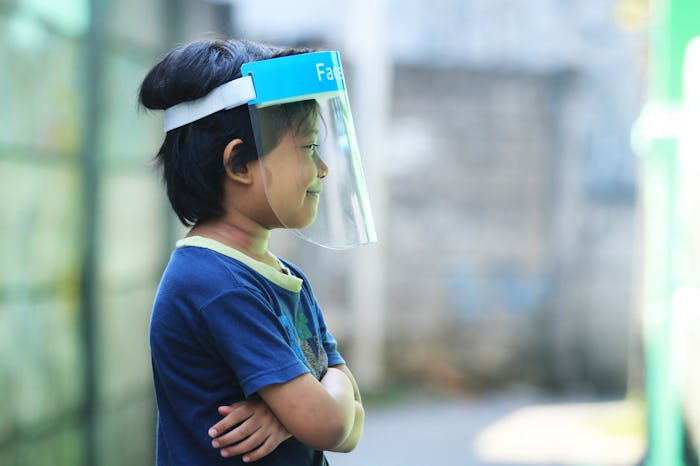Life

Are Face Shields As Safe As Masks? An Expert Explains
With schools restarting and businesses opening at different rates around the country, parents are not only worried about protecting their families day-to-day, but also keeping their children safe if they get into class again. Parents, teachers, and basically anyone out in the world might be wondering about the safety of face shields versus masks when it comes to protection from the coronavirus. But medical experts and the Centers for Disease Control and Prevention (CDC) seem to agree that masks are still the safest option.
Michelle Maynard, system infection prevention and control manager for Baptist Health in Jacksonville, Florida, tells Romper in an interview that cloth and disposable masks are preferred for controlling COVID-19.
“Face shields are not as effective as masks when you’re talking about providing protection for others,” she says. “Face coverings are recommended as a barrier to prevent respiratory droplets from traveling through the air, to protect others. The CDC records show that there really isn’t much known about whether face shields provide any benefits in protecting others.”
And, in terms of protecting the person wearing the face shield, it would have to meet the CDC guidelines for proper fit to actually keep you safe.
“The recommendation from the CDC is if you are going to wear a face shield without a mask, make sure it wraps around the sides of your face and extends below the chin. They want to make sure you have that wide coverage so you’re protecting your eyes, your nose, your mouth, anywhere respiratory droplets could potentially get in,” Maynard explains.
There are some situations where wearing face shields may be helpful, like for family members with a loved one who is deaf or has hearing loss and uses lip reading, or children with autism spectrum disorder who rely on facial expressions as social cues. Maynard says there are specialized face masks available for scenarios like these.
“The CDC recognizes that wearing a safe covering may not be possible for everyone in every situation, so they do provide some recommendations for adaptations and alternatives,” says Maynard. “For people who are deaf or hard-of-hearing who rely on lip reading to communicate, they do recommend clear face coverings. There are face coverings that are clear where you’re able to visualize and lip read. There are times when that kind of face covering or shield may not be available. The CDC has talked about using written communication, closed captioning, and decreasing background noise so someone wearing a cloth mask might be able to speak louder.”
Ultimately, Maynard says masks are the best way to protect both yourself and others. Controlling the spread is the only way to keep the virus under control, which is why you don’t see face shields recommended like masks are. Families can also practice good infection control and home, and teach their kids about keeping up with hand hygiene when they’re back at school.
“There really isn’t support that face shields are more effective than masks. There hasn’t been a recommendation that face shields should be used for everyday activities, and they’re certainly not replacements for the cloth masks,” says Maynard. “I always make sure we’re reminding people how to protect yourself — that’s truly knowing how it spreads, between people in close contact with one another through respiratory droplets. The best things we can do are make sure we’re washing our hands often, avoiding close contact with people who are sick or don’t live in our household, and if we are sick, that we’re covering our mouth or nose with a face covering when around others. Also, clean and disinfect frequently on those high-touch surfaces. It works."
Expert:
Michelle Maynard, system infection prevention and control manager for Baptist Health